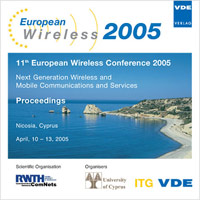Cancellation of Interference from Synchronization and Pilot Channels on High Speed Downlink Shared Channel in UMTS
Konferenz: European Wireless 2005 - 11th European Wireless Conference 2005 - Next Generation wireless and Mobile Communications and Services
10.04.2006 - 13.04.2005 in Nicosia, Cyprus
Tagungsband: European Wireless 2005
Seiten: 6Sprache: EnglischTyp: PDF
Persönliche VDE-Mitglieder erhalten auf diesen Artikel 10% Rabatt
Autoren:
Freudenthaler, K.; Huemer, M. (University of Applied Science Hagenberg, Hardware/Software Systems Engineering, 4232 Hagenberg, Austria)
Freudenthaler, K.; Springer, A. (Johannes Kepler University Linz, Inst. for Communication and Information Engineering, 4040 Linz, Austria)
Kaltenberger, F. (ARC Seibersdorf Research GmbH, 1220 Vienna, Austria)
Paul, St. (Infineon Technologies AG, Secure Mobile Solutions, 81609 Munich, Germany)
Mecklenbräuker, C. F. (ftw. Forschungszentrum Telekommunikation Wien, 1220 Vienna, Austria)
Inhalt:
In this contribution, we describe a newly developed simulation environment for High Speed Downlink Packet Access (HSDPA) in UMTS Release 5 and beyond. The simulation environment implements the downlink physical layer for the High Speed Downlink Shared Channel (HS-DSCH) in detail, whereas the associated signalling messages are idealized as error free. The interference from signalling and data channels on the HS-DSCH is modelled adequately. As a general guideline for system settings in the simulations, we use the test cases specified in 3G TS 25.101 whenever applicable. It is shown that the interference generated by the Synchronization Channel (SCH) and Common Pilot Channel (CPICH) has considerable impact on the error statistics of the HS-DSCH. Therefore, it is worthwhile to implement interference cancellation for the SCH and CPICH in future mobile receivers for HSDPA.


